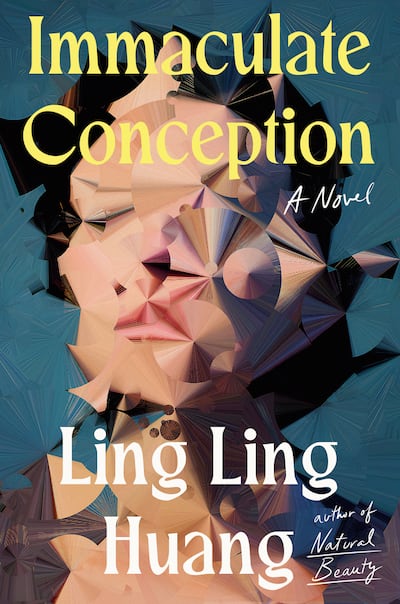When Enka first meets Mathilde as a fellow student at the fictional Berkshire College of Art and Design, she is all at once platonically in love and self-conscious. Soon it is clear that Mathilde is a prodigy. After a tremendously affecting freshman year exhibit, Mathilde’s art career is launched fast and far. Her performance art is featured at some of the biggest galleries in New York and, soon, the world.
Mathilde’s exhibits are borne out of deep traumas and her desire to heal and understand through art. Despite this—and despite Enka’s love for her friend—Mathilde’s success propels Enka into a confusing whirlwind of earnest respect and distracting jealousy.
Immaculate Conception (Dutton, 304 pages, $28) is a new gothic horror novel by Portland writer and Grammy-winning violinist Ling Ling Huang (author of Natural Beauty, a New York Times Editors’ Choice and winner of the Lambda Literary Award for Bisexual Fiction). Though Huang is not a visual artist, and humbly says she is only new to writing, the book is deeply inspired by her experiences as a young music prodigy herself, and by a very painful, confusing experience years ago: Her best friend had an affair with Huang’s then-partner.
“I’ve always thought a lot about friendships and maybe a little obsessively thought, why did she do this to me?” Huang shares. “And, knowing that she loved me very much, throughout this whole process. Never doubting that she loved me and I loved her, but still having this thing happen.”
That kind of confusing love inspired the complicated relationship between Enka and Mathilde. “She isn’t lacking anything,” Huang says of Enka, who constantly compares herself to Mathilde; she flinches every time Mathilde says her work reminds her of some other artist. “She’s just so focused on someone else that she’s not focused on her own art,” Huang says. “She robs herself.”
Huang compares Enka’s jealousy to her experiences working in the classical music world. “There is so much professional and personal jealousy—we’re here for the same reason, but here for the same spots.”

As far as her writing goes, Huang says, “I don’t write necessarily the kinds of things I’m drawn to or that I read. But I can’t really write anything else. It’s the same with music; there is a sadness, and a relief, that we can only be ourselves.”
Consciously or not, Enka tries so hard to pull inspiration from her contemporaries that her focus shifts into dark territory. Soon, Enka gets the break she’s always wanted when she is offered the opportunity to participate in an experimental new science with something called the “SCAFFOLD”: a device implanted in the brain that allows a person to inhabit someone else’s memories and thoughts. When Enka convinces Mathilde to get the device implanted in her own brain so that their two minds can be linked, boundaries start to blur, and what started off as an idea for performance art becomes a mind-bending, distressing manipulation.
“Every app that we have uses ‘empathy’ as the reason they exist; they’re always promising connection…in a new way that would somehow deepen our relationships. But, really, the opposite has happened,” Huang says. “There is obviously a poverty in empathy, and what surprised me in the process of writing this book is thinking about how these people who are coming up with these apps, they really have to believe that what they’re doing is different and worthwhile.”
Conception gets its title from another medical marvel in the book: Mathilde goes through a procedure that allows her to become pregnant without the use of male genetics at all. The results become both exciting and devastating, giving Mathilde another layer of trauma that informs her art and her life choices.
When I refer to the novel as literary sci-fi, Huang lights up and says, “I would love for sci-fi to claim me! I love sci-fi,” she says, referencing The Square and Velvet Buzzsaw as films that helped her conceptualize certain components of the book.
But above all, Huang’s biggest influence was Elena Ferrante’s Neapolitan series. She references a quote about My Brilliant Friend from a 2016 interview in The Gentlewoman magazine, in which interviewer Deborah Orr asks, “Would it be right to view Lila as a savant, gifted in a way that Elena isn’t?” Ferrante replies: “No. The structure of the narrative is such that neither Lila nor Elena can ever be definitively locked within a formula that makes one the opposite of the other.”
“That was such an inspirational line, throughout the writing of this book,” Huang says, adding with a slight chuckle, “and my life.”
GO: Ling Ling Huang appears in conversation with Chelsea Bieker at Powell’s City of Books, 1005 W Burnside St., 800-878-7323, powells.com. 7 pm Wednesday, May 14. Free.

